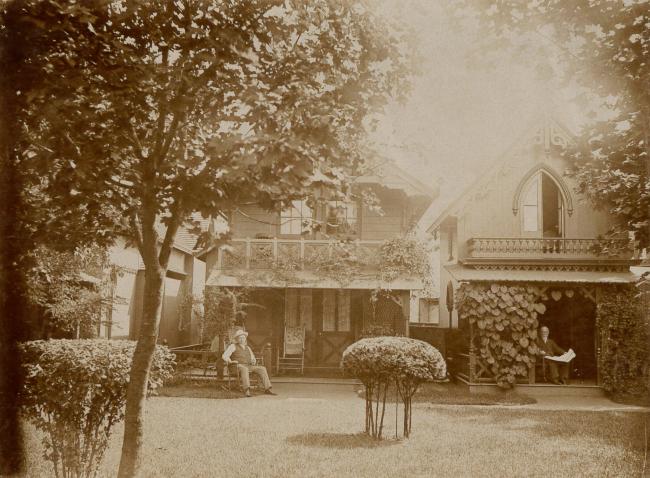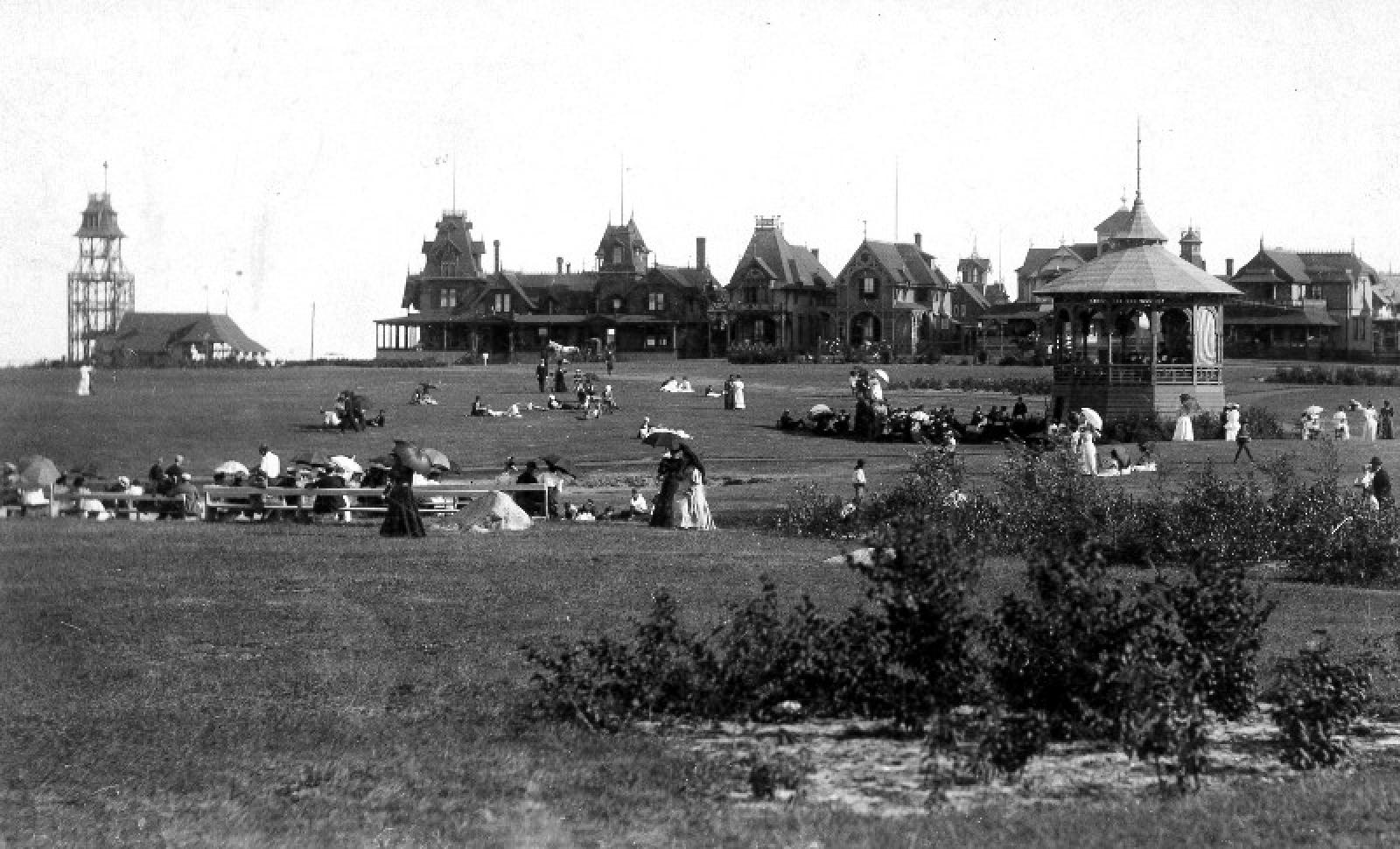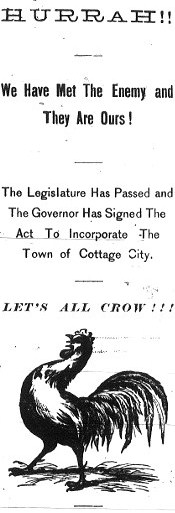The whininess, contempt and partisanship with which the Vineyard Gazette reported this story over six years is journalism in its brightest rain-slicker yellow - all the more embarrassing and entertaining today because the paper lost the fight.
The tedious, never-ending complaint of Mr. Marchant and his successor Samuel Keniston was that Edgartown men had built Oak Bluffs and that the vassals ought to be grateful. The Cottage City Star, founded in the spring of 1879 to further the secessionist cause, called the Gazette the “hydra-headed Edgartown organ” and when Oak Bluffs finally broke away in February 1880 hooted that “an enemy, shrewd, energetic and tricky, had been met and overcome by means and weapons of a manlike character. And not only overcome, but whipped most severely.”
One searches largely in vain for an objective record of the debate or legislative process.
From the Vineyard Gazette edition of August 31, 1877:
One would think to read the Boston paper that there had been a terrible commotion on the Vineyard in respect to the division of the town of Edgartown. The facts in the case are as follows: On Thursday afternoon of last week, in answer to a call, a number of persons assembled at the Tabernacle, in Vineyard Grove, for the purpose of discussing the propriety of dividing the town. Those present were mostly nonresidents of the Island, who claimed that citizens of the town had no right to participate in the doings of the meeting. The speakers generally thought that the taxes were large and far in excess of what they should be; that the section where the Camp Meeting was located paid most of the tax and received but a very little in return, while Edgartown proper was lightly taxed, and derived most of the benefit from the money raised.
A more erroneous impression never took possession of an evangelical body. These men in the discussion which took place proved themselves to be as ignorant as men possibly can be of the true state of the affairs of which they complain. They stated that their section paid into the town treasury last year $13,000. The assessors’ books show that the whole amount assessed this year upon the nonresidents on the Martha’s Vineyard Camp Ground was $231,275, on which they paid a tax of only $2,960.32. Let it be remembered that the above includes stores, hotels, shops, ice houses, and everything on which there is one cent of taxation, and it will be seen what a splendid case they have to carry to the General Court.
It was amusing to witness the manner in which the meeting was conducted. A chairman was chosen to preside over the deliberations, and a secretary appointed to record the doings. The latter, who seemed a lordly sort of a fellow, proved to possess a power greater than the head of the meeting, and often took the conduct of the assembly into his own hands. He reminded one at times, when a speaker got a little off the track and said something not in unison with his views, of the southern slaveholder, when cracking his whip over the backs of his slaves. His subjects generally rendered willing obedience to his demands, and the chairman even sank into utter insignificance and cowered like a frightened cur before his sledgehammer blows and windy, frothy appeals to his hearers. He said he was not ignorant of the law which governed towns, the body which he represented was not, and it was the height of impudence to call him and them so. But has he not proved himself an ass in refusing to receive information which would have given him all the facts in the case?
He strutted, and crowed, and grinned, and raved, like one fully mad, or possessed of an evil spirit, and made assertions which every well informed man present knew to be false, and some of which were flatly contradicted on the spot. We are willing to do the secretary exact justice. We learn from those who ought to know, that he is a very good sort of a man, easily excited, and fond of exhibiting a little egotism.
He evidently wished his audience to believe, all the time that his foolishness was getting the better of his wisdom. He will do well in future to remember, that the most ridiculous animal in the world is a proud priest, who cannot use his own tools, outside his own profession, without cutting his own fingers.
These men, these nonresidents, think that they have the right and the power to divide Edgartown, believing as they do that they possess a majority of the taxable property of the town. No other than an ignoramus would suppose, however, that the sum of $231,275 was a major portion of $2,131,350, the total valuation of the town.
A motion was made to appoint a committee, whose duty it should be to petition the General Court for a division of the town. The motion was carried, 15 to 12, five women voting in the affirmative.
While all this fuss about a very small matter is driving the true object for which those religious brothers assembled here entirely out of their heads, the citizens of Edgartown proper look upon the whole affair with the most serene composure, not caring a brass farthing whether the town is divided or not. Certainly there is no man of any influence within our borders who will object to a fair and equitable division Ñ not that our citizens wish it, or care for it Ñ but they are simply willing (knowing as they do that those who think themselves aggrieved have always had more than their share of the offices and the money raised by the town by taxation) that they should go out from among us and fight their own way to freedom and renown. Theirs will be a perfect utopia, enjoying the greatest perfection in politics, laws and religion. There will be neither weeping, nor wailing, nor gnashing of teeth in all their dominions. No debt shall be known there, and every man’s purse shall be filled with gold all the time and forever. The rulers will be men of wisdom and integrity, who will run the machine at their own expense; taxation, and debt, and distrust, and disease, will all lay aside their robes, and purity, and peace, and love, and friendship, will dwell in the midst of the beautiful city forever and ever; and all the people in the state and the nation, and all the isles of the sea, shall clap their hands and sing praises; for lo and behold, a new town, without spot or blemish, has been born, whose influence shall be perpetual for the good of the race. And the citizens of the new town shall sing, day and night:
“O this heavenly town!
“O this heavenly town, of rare renown!”

January 9, 1880:
The question of resistance to the proposed division of Edgartown is again before the people of the town, and the initial steps towards meeting the exigencies of the situation have already been taken. There are two aspects of this question which commend themselves to the consideration of all thoughtful men, a brief allusion to which may not be out of place here and now.
And first, is the preservation of the town in its present form desirable? We suppose that in the south section, in what is generally styled Edgartown, there can hardly be a difference of opinion on this point. Apart from the consideration of self-interest, which - in view of the present valuation of Cottage City and its immediate promise of substantial advancement, as evidenced by the extensive operations already in progress - obtains in this case to an extent never surpassed in the history of the attempted division of towns - apart from this consideration, there is a sentimental aspect of the case which is well worth considering.
We suppose the native villager who is ready to stand up and say that he has no objection to this old township, which has come down from the dimness of a remote past to the present generation in its present form, which has been “in the family,” so to speak, through so many generations, which in point of population and municipal wealth has held an honorable place among the towns of the commonwealth - we suppose that the man who views with indifference the proposition to cut the territory so bequeathed to him in twain, because a few native malcontents, aided by a numerous company of immigrants and visitors, violently insist that he shall, is surely a rara avis, and there must be something in the circumstances of his case that distinguish him from other men.
Happily, we know of none such. If, however, any faint-hearted brother shall say, “They’re a thorn in the flesh to us - let’s be rid of them,” we have only to suggest that no sane man, certainly no man of spirit, gives away or sells for a song one half his property, because a stranger asserts a claim thereto, and backs his assertion with blasts of billingsgate and abusive treatment. It is sometimes the case that the party to a suit, worn out with protracted litigation, enfeebled in body and shattered in mind, prefers rather to sacrifice his rights than to continue a controversy that is embittering his life and fast bringing him to the grave: but that, we take it, is not the condition of the town of Edgartown.
Assuming, then, that there is but one opinion in the minds of the “respondents” as to propriety of resistance, the query next arises - What is the prospect of success? Never so good as now. For whereas the town’s case last winter was as strong as any litigant could desire, and the first vote was only possible in the fog of misrepresentation which had not had time to clear away, while scores of candid men who continued to stand by the petitioners frankly confessed that they had a pledge to keep, and could do no otherwise Ñ now the conditions are still more favorable to the town, and the promise of success correspondingly greater.
Contrast, for instance, the course of the town and of Cottage City during the past year: the one pursuing its accustomed course of providing impartially for the needs of all its parts, the other using its utmost endeavor to paralyze the constituted authorities in the performance of their legitimate functions, and, like a stubborn child, refusing to be benefited by any provision made for it by the common parent. The rejection of the fire engine and the inexcusable war upon the board of health are sufficient examples in point, and we take it that so far as showing the fitness of the petitioners for self-government is concerned, they will have no more serious difficulty to contend with than their conduct in the above connection.
Furthermore, the authorities themselves, in the exercise of the prerogatives devolving upon them officially, have not been behind in supplementing the laudable intentions and efforts of the town at large. The school question is as good an example of this as any. Three or four years ago the people of the northern section demanded that a teacher “such as you employ in the village” be sent to them in place of one then serving, and upon the expiration of the year the thing was done, and apparently to the satisfaction of everybody. But last year there began to be heard a cry for a “male teacher” and one not “from the village,” and immediately upon the commencement of another school year that request was granted. And so on to the end of the chapter.
In view, then, of the fact that the protracted investigation of the case of last winter tended so largely to correct the one-sided character which it seemed theretofore to have borne, in view of the fact that the “circular-work” of last year can hardly be done over again with effect, estimating justly the attitude of the town toward the disaffected section during the past year - the apportionment of officers and money, and the prompt attention to all reasonable demands - and contrasting therewith the factious and undignified bearing of the petitioning party; remembering, finally, that whatever light talk about “influence” and “money” may be indulged in by thoughtless people, it is no easy task to persuade the majority of a Massachusetts legislature to deliberately commit a flagrant wrong, we cannot help believing that the town will go into the next contest with a stronger assurance of success than ever before.

February 20, 1880:
The bill for the incorporation of the town of Cottage City received the Governor's signature last Tuesday.
Obsequies
We don’t know that any remarks are required of us on this occasion. In fact, we are so uncertain as to whether a majority of the assembled friends regard it as a “melancholy occasion,” or the reverse, that we are in great doubt as to whether words of condolence or of congratulation will be the more acceptable. And perhaps it doesn’t matter. The good old town of Edgartown is certainly divided, and it is not only useless to cry for spilt milk on the one hand, but on the other hand if there are those who extract any considerable amount of comfort from the situation as now presented, and feel that this should be a season of general hilarity on the part of the present Edgartown, we have no disposition to begrudge them whatever of enjoyment the changed conditions afford, and shall interpose no dismal croakings of our own to jar upon the general joy. If what might once have been a doleful funeral has, by the lapse of time and the march of events, succeeded in taking upon itself the characteristics of a jovial “wake,” perhaps so much the better.
There is one thing, however, that should not be lost sight of. The division of Edgartown has not been aided by the men who were ready to contribute generously of their means, and unlimitedly of personal effort, in a manful struggle for the maintenance of their rights and the preservation of their ancient heritage; and the responsibility of the disaster, if such it be, can in no sense he made to rest upon them, while to the honor of having secured the termination of the contest, if it be so regarded, they doubtless make no claim.
The question of division, then, being settled, there remaineth to the town of Edgartown but one course; and that is forgetting the things that are behind, to address itself manfully to the task of improving its condition, by taking advantage of such opportunities as are still presented within its now diminished area, and so prove to its detractors that it has the elements within itself, even as now constituted, for maintaining the creditable position which it has held for two hundred years, and thus compel from all men the respect which is its due.












Comments